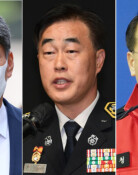No Viable Presidential Pledges Being Made
No Viable Presidential Pledges Being Made
Posted November. 24, 2007 03:03,
When reporters look for go-to persons in each party to write articles of major presidential pledges, responses from them usually are: I dont know, but so and so may, as they pass the buck. What happens in the end is that reporters end up not being able to write anything.
Lee Hoi-chang, the former Grand National Party (GNP) chief, recently announced his non-party-affiliation. He has not been able to come up with any concrete promises even though he said he would upgrade the pledges he made in 2002 when he was a GNP presidential candidate.
Many political analysts say that the candidates this year lack vision, policies, and any sort of political philosophy due to negative election trends, as a result of non-existent party politics and overzealous efforts to win the presidency.
Others think that believing that they can pull off a come-from-behind victory, a feat achieved by ex-presidential candidate Roh Moo-hyun, by holding a peoples primary. Instead of presenting specific visions for the next five years and demonstrating capabilities as presidential candidates, many candidates are being opportunistic and are doing what they think will win them more votes. On top of that, they are engaging in negative campaigning to hit the jackpot, which they believe will be a ticket to Cheong Wa Dae.
For example, the United New Democratic Party (UNDP), a week before registering its presidential candidate, has been mainly focusing its energy on briefings and commentaries on the alleged BBK stock price fabrication, the extradition of Kim Gyeong-jun, the press conference of his wife Lee Bo-ra in Los Angeles, and his older sister Erica Kims fabricated media interviews.
By flashing a few pages of contracts that do not have any bearing on the future of Korea or the interests of the electorate, all they did was to keep tabs on what the Kims are saying about GNP presidential candidate Lee Myung-bak.
The GNP, which had said that it would sell a book filled with pledges of its presidential candidate, is putting off the publication and is going out of its way to carry out a war on con men, as it is concerned that the public may turn their backs on its presidential candidate.
Lee Hoi-chang, the Creative Korea Party, the Democratic Party, and the Democratic Labor Party are all bent on seeking truths in the BBK scandal, and are hoping that doing so will change the election landscape once and for all.
In addition, some pledges that have been made are not feasible or contradict each other.
All these are rendering the ongoing manifesto campaigns useless. The National Election Commission released a survey of 1,500 adults on November 22 and 69.6% of respondents said the presidential election campaign is tainted. The biggest culprits cited were mudslinging and false propaganda.
swpark@donga.com







